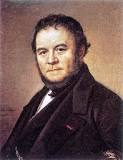The Red and the Black Page #16
Le Rouge et le Noir is a historical psychological novel in two volumes by Stendhal, published in 1830. It chronicles the attempts of a provincial young man to rise socially beyond his modest upbringing through a combination of talent, hard work, deception, and hypocrisy.
Throughout his whole life he had only spoken sincerely to the old Surgeon-Major. The few ideas he had were about Buonaparte's Italian Campaigns or else surgery. His youthful courage revelled in the circumstantial details of the most terrible operations. He said to himself. "I should not have flinched." The first time that Madame de Rênal tried to enter into conversation independently of the children's education, he began to talk of surgical operations. She grew pale and asked him to leave off. Julien knew nothing beyond that. So it came about that, though he passed his life in Madame de Rênal's company, the most singular silence would reign between them as soon as they were alone. When he was in the salon, she noticed in his eyes, in spite of all the humbleness of his demeanour, an air of intellectual superiority towards everyone who came to visit her. If she found herself alone with him for a single moment, she saw that he was palpably embarrassed. This made her feel uneasy, for her woman's instinct caused her to realise that this embarrassment was not inspired by any tenderness. Owing to some mysterious idea, derived from some tale of good society, such as the old Surgeon-Major had seen it, Julien felt humiliated whenever the conversation languished on any occasion when he found himself in a woman's society, as though the particular pause were his own special fault. This sensation was a hundred times more painful in tête-à-tête. His imagination, full as it was of the most extravagant and most Spanish ideas of what a man ought to say when he is alone with a woman, only suggested to the troubled youth things which were absolutely impossible. His soul was in the clouds. Nevertheless he was unable to emerge from this most humiliating silence. Consequently, during his long walks with Madame de Rênal and the children, the severity of his manner was accentuated by the poignancy of his sufferings. He despised himself terribly. If, by any luck, he made himself speak, he came out with the most absurd things. To put the finishing touch on his misery, he saw his own absurdity and exaggerated its extent, but what he did not see was the expression in his eyes, which were so beautiful and betokened so ardent a soul, that like good actors, they sometimes gave charm to something which is really devoid of it. Madame de Rênal noticed that when he was alone with her he never chanced to say a good thing except when he was taken out of himself by some unexpected event, and consequently forgot to try and turn a compliment. As the friends of the house did not spoil her by regaling her with new and brilliant ideas, she enjoyed with delight all the flashes of Julien's intellect. After the fall of Napoleon, every appearance of gallantry has been severely exiled from provincial etiquette. People are frightened of losing their jobs. All rascals look to the religious order for support, and hypocrisy has made firm progress even among the Liberal classes. One's ennui is doubled. The only pleasures left are reading and agriculture. Madame de Rênal, the rich heiress of a devout aunt, and married at sixteen to a respectable gentleman, had never felt or seen in her whole life anything that had the slightest resemblance in the whole world to love. Her confessor, the good curé Chélan, had once mentioned love to her, in discussing the advances of M. de Valenod, and had drawn so loathsome a picture of the passion that the word now stood to her for nothing but the most abject debauchery. She had regarded love, such as she had come across it, in the very small number of novels with which chance had made her acquainted, as an exception if not indeed as something absolutely abnormal. It was, thanks to this ignorance, that Madame de Rênal, although incessantly absorbed in Julien, was perfectly happy, and never thought of reproaching herself in the slightest. CHAPTER VIII LITTLE EPISODES "Then there were sighs, the deeper for suppression, And stolen glances sweeter for the theft, And burning blushes, though for no transgression." Don Juan, c. I, st. 74. It was only when Madame de Rênal began to think of her maid Elisa that there was some slight change in that angelic sweetness which she owed both to her natural character and her actual happiness. The girl had come into a fortune, went to confess herself to the curé Chélan and confessed to him her plan of marrying Julien. The curé was truly rejoiced at his friend's good fortune, but he was extremely surprised when Julien resolutely informed him that Mademoiselle Elisa's offer could not suit him. "Beware, my friend, of what is passing within your heart," said the curé with a frown, "I congratulate you on your mission, if that is the only reason why you despise a more than ample fortune. It is fifty-six years since I was first curé of Verrières, and yet I shall be turned out, according to all appearances. I am distressed by it, and yet my income amounts to eight hundred francs. I inform you of this detail so that you may not be under any illusions as to what awaits you in your career as a priest. If you think of paying court to the men who enjoy power, your eternal damnation is assured. You may make your fortune, but you will have to do harm to the poor, flatter the sub-prefect, the mayor, the man who enjoys prestige, and pander to his passion; this conduct, which in the world is called knowledge of life, is not absolutely incompatible with salvation so far as a layman is concerned; but in our career we have to make a choice; it is a question of making one's fortune either in this world or the next; there is no middle course. Come, my dear friend, reflect, and come back in three days with a definite answer. I am pained to detect that there is at the bottom of your character a sombre passion which is far from indicating to me that moderation and that perfect renunciation of earthly advantages so necessary for a priest; I augur well of your intellect, but allow me to tell you," added the good curé with tears in his eyes, "I tremble for your salvation in your career as a priest." Julien was ashamed of his emotion; he found himself loved for the first time in his life; he wept with delight; and went to hide his tears in the great woods behind Verrières. "Why am I in this position?" he said to himself at last, "I feel that I would give my life a hundred times over for this good curé Chélan, and he has just proved to me that I am nothing more than a fool. It is especially necessary for me to deceive him, and he manages to find me out. The secret ardour which he refers to is my plan of making my fortune. He thinks I am unworthy of being a priest, that too, just when I was imagining that my sacrifice of fifty louis would give him the very highest idea of my piety and devotion to my mission."
Translation
Translate and read this book in other languages:
Select another language:
- - Select -
- 简体中文 (Chinese - Simplified)
- 繁體中文 (Chinese - Traditional)
- Español (Spanish)
- Esperanto (Esperanto)
- 日本語 (Japanese)
- Português (Portuguese)
- Deutsch (German)
- العربية (Arabic)
- Français (French)
- Русский (Russian)
- ಕನ್ನಡ (Kannada)
- 한국어 (Korean)
- עברית (Hebrew)
- Gaeilge (Irish)
- Українська (Ukrainian)
- اردو (Urdu)
- Magyar (Hungarian)
- मानक हिन्दी (Hindi)
- Indonesia (Indonesian)
- Italiano (Italian)
- தமிழ் (Tamil)
- Türkçe (Turkish)
- తెలుగు (Telugu)
- ภาษาไทย (Thai)
- Tiếng Việt (Vietnamese)
- Čeština (Czech)
- Polski (Polish)
- Bahasa Indonesia (Indonesian)
- Românește (Romanian)
- Nederlands (Dutch)
- Ελληνικά (Greek)
- Latinum (Latin)
- Svenska (Swedish)
- Dansk (Danish)
- Suomi (Finnish)
- فارسی (Persian)
- ייִדיש (Yiddish)
- հայերեն (Armenian)
- Norsk (Norwegian)
- English (English)
Citation
Use the citation below to add this book to your bibliography:
Style:MLAChicagoAPA
"The Red and the Black Books." Literature.com. STANDS4 LLC, 2025. Web. 10 Mar. 2025. <https://www.literature.com/book/the_red_and_the_black_201>.








Discuss this The Red and the Black book with the community:
Report Comment
We're doing our best to make sure our content is useful, accurate and safe.
If by any chance you spot an inappropriate comment while navigating through our website please use this form to let us know, and we'll take care of it shortly.
Attachment
You need to be logged in to favorite.
Log In